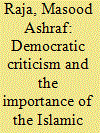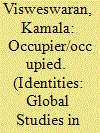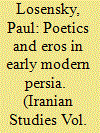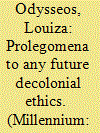|
|
|
Sort Order |
|
|
|
Items / Page
|
|
|
|
|
|
|
| Srl | Item |
| 1 |
ID:
123071


|
|
|
|
|
| Publication |
2013.
|
| Summary/Abstract |
Relying on major debates in reception and reader response theory, this essay attempts to explore the possibilities of reading metropolitan texts about Islam and Islamic culture with an understanding of the Islamic modes of meaning-making and interpretation. Geared toward scholars and students of literature and culture, the essay hopes to foster a more nuanced and complex approach to reading texts that appropriate Islamic raw materials in order to represent a mostly Western poetics and politics.
|
|
|
|
|
|
|
|
|
|
|
|
|
|
|
|
| 2 |
ID:
092948


|
|
|
|
|
| Publication |
2009.
|
| Summary/Abstract |
The patronage system at the Mughal court drew many Safavid poets and men of learning to India who interacted with Indians at various levels. In an unusual case, the young Iranian poet 'Urf?'s attachment to his patron, Prince Sal?m (later Emperor Jah ng?r), was interpreted by some as more than merely professional and the poet's death at a young age gave rise to speculations of intrigue. Mughal princesses were also actively involved in the literary scene of the time. In another instance, the association of Princess Z?bunnisa, daughter of the Emperor Awrangz?b, with Persian poets was sometimes personal, leading to gossip and scandal about her. It turns out that in both cases stories about the sexual aspects of the relationships between Mughal patrons and Iranian poets arose in the eighteenth century and are more reflective of the concerns of the literary culture of that period. This paper explores the power and gender dynamics of these poet-patron relationships in the context of the general Iranian-Indian tension at the Mughal court and a highly developed and creative tradition of crafting biographical accounts.
|
|
|
|
|
|
|
|
|
|
|
|
|
|
|
|
| 3 |
ID:
116578


|
|
|
|
|
| Publication |
2012.
|
| Summary/Abstract |
As military occupation increasingly informs the politics of both democracies and dictatorships, capitalist and socialist regimes, this essay asks why it is foundational for sovereignty and the post-war state-form. In particular, it questions the complicity of post-colonial theory with security discourses in reading movements for self-determination as threats to the state or as forms of terrorism rather than as alternate possibilities for freedom and liberty. It suggests not only that the ongoing twenty-first century relations between occupier and occupied reprise the racialised forms of identity that characterised relations between coloniser and colonised in the preceding two centuries, but also that relations between occupied peoples may produce affiliative poetics and shared terms of political reference or solidarity.
|
|
|
|
|
|
|
|
|
|
|
|
|
|
|
|
| 4 |
ID:
092947


|
|
|
|
|
| Publication |
2009.
|
| Summary/Abstract |
The poet Muhtasham K sh n? (d. 1588) is today known primarily for his strophic elegy on the martyrdom of Imam Husayn at Karbal , but such devotional poems make up only a tiny fraction of large oeuvre. Far more substantial are two works of a very different tenor, Nuql-i 'Ushsh q (The Lover's Confection) and Ris la-yi Jal liyya (The Glorious Epistle). Using an innovative combination of prose and poetry, these works tell the story of the poet-narrator's stormy affairs with, respectively, an upper-class courtesan and a footman attached to a nobleman's house. As part of the larger literary movement known as the maktab-i vuq ' or "realist school," these purported autobiographical accounts of Muhtasham's amorous adventures reveal a sophisticated culture of eros and desire that differs strikingly from the usual representations of the state of literature and the arts under Shah Tahm sp. After situating these works in their historical, literary, and cultural contexts, the article turns to a close analysis of an extended passage from each work to show how Muhtasham integrates lyric poetry, narrative, and setting to depict the pursuit of desire in the urbane world of early modern Persia
|
|
|
|
|
|
|
|
|
|
|
|
|
|
|
|
| 5 |
ID:
153672


|
|
|
|
|
| Summary/Abstract |
Decolonial thought has wrought a devastating critique on the Academy and wide-ranging fields within it. Decolonial critique entails undeniable and multiple ethico-political orientations arising from concrete struggles within the ‘unfinished project of decolonization’ (Maldonado-Torres), as well as recent articulations of decolonial ethics. This article argues that, as decolonial critique, and calls for decolonial ethics, begin to find their way into broader theoretical discussions in the social sciences and humanities, it may be more fruitful to insist on the question of decolonial ethics. It encourages retaining the disruptive potential of decolonial critique by resisting its immediate translations into available ethical registers and traditions that unwittingly reassert, and remain bound to, forms of ethical expression dependent on generalised narratives, which occlude their histories of violent and racialised exclusion and masterful figurations of ethical subjectivity. Outlining Sylvia Wynter’s excavation of prominent figurations of the human as ‘Man’, I argue that our conceptions of ethical subjects too rest on such figurations. The article, therefore, discusses three prolegomena to any future decolonial ethics: the decolonial critique and displacement of the figure of ‘Man’ as ethical subject within racialised coloniality; the development of a decolonising poetics, whose ethos of irreverence seeks forms of poetic revolt that draw on struggles to question systems of ethical thought and knowledge; finally, a discussion of the contours of a praxis of being hybridly human through the development of ‘education’ as an incessant and ‘unfinished’ project.
|
|
|
|
|
|
|
|
|
|
|
|
|
|
|
|
| 6 |
ID:
167416


|
|
|
|
|
| Summary/Abstract |
Joining the discussion of revolution and resistance in world politics, this article puts forward the idea of poetic revolt as a necessary companion to these terms, one which centres attention on the ongoing reverberations of transatlantic slavery – what have been called its ‘afterlives’ (Saidiya Hartman, Édouard Glissant). Engaging with contributions to poetics, black studies and black feminist thought, it first develops a theoretical orientation of the ongoingness of slavery as a ‘grammar of captivity’ (Hortense Spillers) that ‘wake work’, a term proposed by Christina Sharpe, aims to disrupt. The article calls for methodological attention to the fugitive and wayward arts and acts of living, that is, what Sylvia Wynter and Fred Moten call the ‘sociopoetic’ practices of enslaved and legally-emancipated populations to illuminate the simultaneity and entanglement of structuring violence and poetic revolt. Second, drawing on Spillers’ scholarship on homiletics – the study of and participation in sermons – in particular United States contexts, it identifies and discusses three aspects of poetic revolt: ‘fabulation’, world-making otherwise and resignification, through which such communities developed a critical and insurgent posture aimed at rupturing this grammar of captivity and at forging critical, futurally-oriented sociabilities. Third, in conclusion, it discusses the links of poetic revolt, in its specificity in Atlantic slavery, to wider systemic critique. Pluralising our thinking on revolution and resistance, poetic revolt, it argues, is best seen as a critical meditation on futurity.
|
|
|
|
|
|
|
|
|
|
|
|
|
|
|
|
|
|
|
|
|